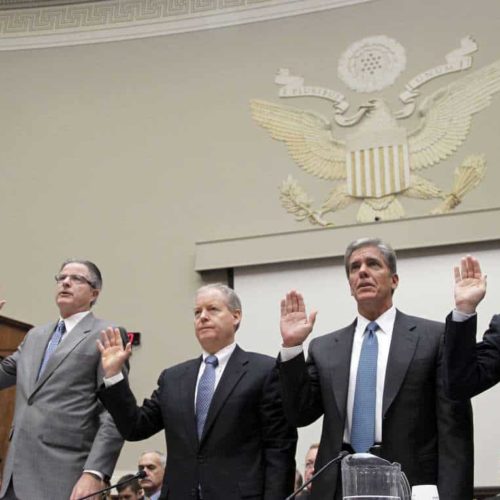Introduction
As Congress debates what to do about surging gas prices – whether to expand drilling, for instance, or end federal tax breaks for oil companies — this much is clear: energy executives, including some who are being summoned to testify on Capitol Hill today, are among the nation’s highest paid CEOs.
On a list of highest-paid top corporate bosses compiled by the Associated Press, Ray Irani, CEO of Occidental Petroleum Corp., ranked second, taking home $76.1 million in 2010. ExxonMobil CEO Rex Tillerson came in at No. 18, with compensation of $21.5 million.
Other executives that ranked among the top 50 were James Hackett of Anadarko Petroleum and James Mulva of ConocoPhillips, at $18.8 million and $17.9 million, respectively. CEOs whose companies have major roles in the energy business made the list, including Aubrey McClendon of Chesapeake Energy, $21 million; G. Steven Farris of Apache, $19.3 million; Andrew Liveris of Dow Chemical, $17.7 million; and J. Brett Harvey of CONSOL Energy, $16.6 million.
The AP analysis took into account factors such as salary, bonuses, perks and stock options.
Congress is debating whether to end subsidies to large oil companies. Senate Democrats announced legislation Tuesday that would repeal tax incentives for the five biggest oil companies: ExxonMobil, Shell, BP, Chevron and ConocoPhillips. And the Senate Finance Committee is scheduled to hold a hearing Thursday on oil and gas tax incentives and rising gas prices.
CEOs from the five companies are expected to face the grilling at the congressional witness table today — an increasingly commonplace event whenever gasoline prices rise. Executives from the same five companies testified in 2008. Senators are expected to press them for explanations about rising prices at the pump — above $5 a gallon in some communities.
Record profits and the higher prices Americans pay at the pump have helped Democrats focus on the estimated $4 billion a year the government provides oil companies in tax breaks. Some Democrats and the White House are arguing that the money should be used for alternative energy, instead.
Some Democrats have written letters to the executives coming today urging them to renounce their companies’ “prodigious profits.”
The oil industry argues that eliminating subsidies won’t bring down prices at the pump.
The House last week passed a bill that would expand offshore oil and gas lease sales — a move that some Republicans say could bring down high gas prices. Another Republican-backed bill would force the Interior Department to decide on drilling applications within 30 days. Democrats have said the bills, coming just over a year after the Deepwater Horizon blowout and spill, would not alleviate gas prices and would increase environmental risks.
Read more in Environment
Environment
Fact Check: Permitting some fudging on oil stats
Obama official, defending pace of drilling approvals, cites data selectively


Join the conversation
Show Comments